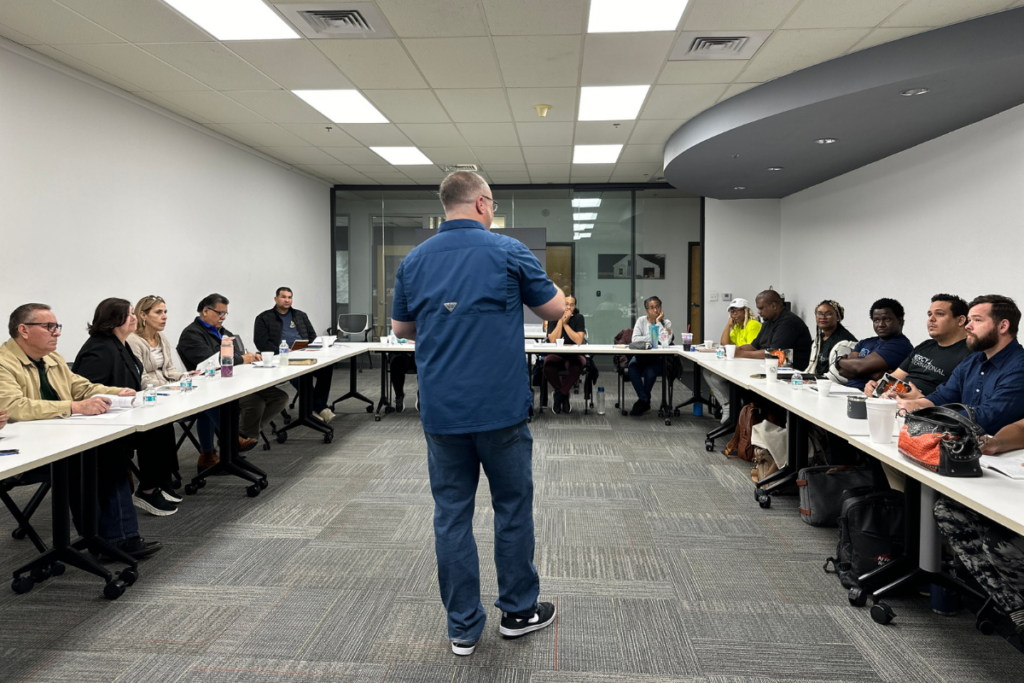Beyond Food Distribution: Daily Bread’s Holistic Approach to Ministry
In 1996, Seth Kuehn owned a food vending business at the same time that he was building relationships with pastors from low-income communities around San Antonio, Texas. Seth was struck by how food vendors were regularly disposing of food while these pastors were serving under resourced communities that were hungry.
Seth envisioned a partnership that would build upon the existing churches’ relationships and access within their own communities to distribute food and, therefore, resolve the problem of hunger. It was from this vision that Daily Bread San Antonio was formed.
For over 25 years, Daily Bread has served as a coordinator between food vendors and ministries that provide food for people who are under-resourced. For most of their ministry, they served faithfully, helping churches meet material needs of their community, but something was missing. Too little was being done to empower those ministries to work toward holistic restoration for those receiving food.
Around 2016, now-Executive Director of Daily Bread, Marcus Walker, read When Helping Hurts and told Daily Bread’s leadership: “We’re doing everything wrong.” He reflects, “We were meeting physical needs, but we were not moving beyond that.”
Marcus told us, “The food was always supposed to be a part of this; however, the role of providing food became overwhelming. For many years, it was just about the food. The need (for food distribution) continued to grow, more churches were hearing about us, and it was all that we had time to do. So the ministry was stuck in crisis-relief efforts.”
Providing Food and Equipping Leaders
Their first response was to begin taking their partners through When Helping Hurts: The Small Group Experience from the Chalmers Center. Marcus said, “The Small Group Experience was the pivotal tool that showed us how to change.” Since Daily Bread equips other ministries, they decided it was important that they were also empowering them to have a holistic approach in their ministries.
The major change was not the work that they do—they still collect food and distribute it to churches and ministries. The major change was the way that they walk in partnership with those ministries. Now, all Daily Bread’s new partners have to take the course, and all existing partners have to retake it every three years as a refresher.
Marcus shared, “The thing we drill down on now is process. The process of how you run your food ministry will determine whether or not people are being relationally restored … I’m not impressed with how many people you feed, I’m wondering how you are developing relationships with the people you serve.”
Applying a Relational Approach in Food Distribution
In practice, this means that the food pantries resourced by Daily Bread cannot be just a quick place to pick up food. They need to be built and managed in a way that makes space for the volunteers and recipients to build relationships together. In fact, if a ministry is only interested in passing out food, Daily Bread will not enter into a partnership. “The Lord has made it clear to us that food is the tool to dive deeper into relationships,” Marcus said.
Marcus shared stories of partners who have shifted their food pantries to a client choice model. This enables them to dignify the people they serve and build closer relationships than a drive through or quick pick-up model allows. In addition, some partners have started hosting large meals where volunteers sit and share a meal with people who are receiving food. Marcus shared that many of their partners hear recipients say, “I come more for the fellowship than for the food.”
This relational approach has even led to better quality food as food vendors build relationships that lead them to want to give quality food to the ministry. Marcus shared that workers at secular vendors will now step outside their business to ask for prayer because they know Daily Bread cares for them and does so from the heart of Christ.
As a next step, Daily Bread developed a partnership with a nearby Chalmers partner, STCH Ministries. STCH facilitates Chalmers’ Faith & Finances course on-site at Daily Bread and in some of the churches that partner with Daily Bread! The classes give the food recipients a chance to take a next step in their development towards holistic flourishing.
The Difference is Felt
In San Antonio, Daily Bread is becoming the alternative to secular food banks because it is known that a church partnered with them can freely share the gospel along with their food ministry. While large secular food pantries exist in the city, churches and ministries know that Daily Bread helps them go beyond meeting just material needs. They currently partner with over 95 ministries in the area, the majority of which are churches.
Marcus has the joy of leading the classes on Chalmers materials for the churches and ministries that partner with Daily Bread. He told us, “I love to see the ‘aha moment’ with these pastors and ministry leaders. They all deal with the frustration of doing so much work and not always seeing much fruit. It doesn’t always occur to them that there is a better way to do this. And the class itself is a trigger for change.”

Through ministries like Daily Bread, the impact of Chalmers is being multiplied in the kingdom as God works to restore the way His people help without hurting. Marcus emphasized, “When the day comes that God calls me to something else, Chalmers’ principles will come with me wherever I go. It’s in my DNA now.”



Food security for all.